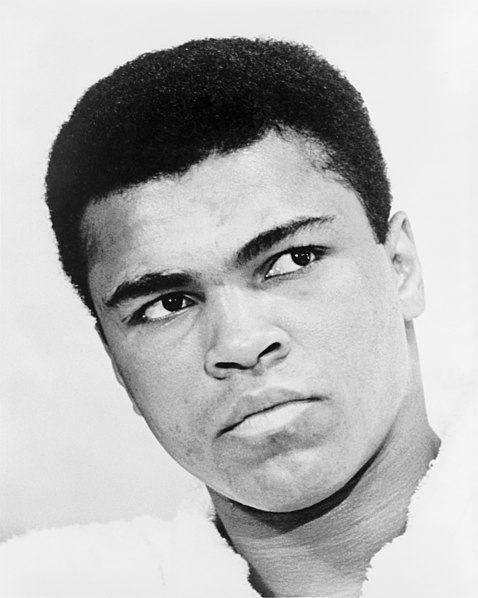From The Kentucky Encyclopedia -
"Float like a butterfly, sting like a bee, Ali's World Champion for time number three": So said Muhammad Ali, probably the quickest heavyweight boxer who ever fought, at the same time bringing style and showmanship to the ring. Ali held the World Heavyweight Championship during 1964-67, 1974-78, and 1978- 79.
Cassius Marcellus Clay -- as Ali was known before he joined the Nation of Islam in 1964 -- was born on January 17, 1942, in Louisville, to Marcellus and Odessa (Grady) Clay. The Clay family lived at 3302 Grand Avenue in the West End of Louisville. Ali took up boxing at age twelve. His first trainer was Joe Martin at Columbia Gym, who paid Ali four dollars each time one of his fights appeared on a local television program, " Tomorrow's Champions." Ali then switched to trainer Fred Stoner, joining Stoner's camp at the Grace Community Center. He attended Central High School in Louisville, where his studies suffered because of his intense involvement with boxing.
Ali won six Golden Gloves tournaments in Kentucky in weight classes from light to welter to heavy; the total number of his amateur fights is unknown. In 1959 and again in 1960 he won the Light Heavyweight National Golden Gloves and National AAU tournaments. As AAU champion he was invited to the Olympic trials, and became the light heavyweight entry for the United States. He defeated "Ziggy" Pietrzykowski of Poland for the gold medal in 1960.
On October 29, 1960, Ali made his first professional appearance, winning over Tunney Hunsaker by a decision. Needing money to repair his parents' home, he had signed for the fight himself. Ali then contracted to be managed by a group of Louisville millionaires led by William Faversham and remained with them until 1967. His promoters had scheduled training with fighter Archie Moore, but Ali quickly left and hired Angelo Dundee to manage and train him as a professional. Ali worked his way up the ranks, and on February 25, 1964, he scored a seventh-round knockout against Sonny Liston to win the world heavyweight championship.
After a swing through Europe, where he defeated all contenders, Ali received an army induction notice. Although Ali was offered both a commission and a support services assignment, he refused induction for religious reasons. He was sentenced to five years in prison and a $10,000 fine. The World Boxing Association then stripped him of his title on April 28, 1967, and awarded it to "Smokin"' Joe Frazier, the beginning of a bitter feud between the two fighters. Although Ali did not serve jail time, he was barred from boxing, his livelihood.
During his three-year exile from the ring, Ali toured colleges and universities making speeches about civil rights. On June 20, 1970, the U.S. Supreme Court decided in his favor in the army induction case, and Atlanta gave him his first boxing license, which effectively ended the exile. In his first return bout, held amidst protest on October 26, 1970, Ali knocked Jerry Quarry out in three rounds. The feud with Frazier festered, and the first Ali- Frazier bout was scheduled -- Ali's first million-dollar purse and his chance to win back the world heavyweight title. The fight, outstanding in boxing history, was held in New York City on March 8, 1971. Frazier won the fifteen- round decision and retained the championship. Ali suffered his second loss, as well as a broken jaw, at the hands of Ken Norton on March 31, 1973.
Ali met George Foreman, then the champion, on October 30, 1974. This fight, called the "Rumble in the Jungle," took place in Kinshasa, Zaire, and featured a $5 million purse for each man. Ali changed from his famous shuffle, dance, and rope-a-dope style, and stood toe-to-toe with the hard-punching Foreman. The result was a worn-down Foreman whom Ali knocked out in the eighth round to reclaim the championship. The hard-driven Frazier, however, was still there to challenge for the title. Perhaps the greatest heavyweight fight in history was the "Thrilla in Manila" between Ali and Frazier on September 30, 1975. The fight was an action-packed brawl that finally ended when Frazier could not answer the bell for the fifteenth round. Ali lost the title on February 15, 1978, by decision to Leon Spinks, then regained it from him on September 15, 1978, by unanimous decision, becoming world heavyweight champion for the third time. Ali last fought on October 2, 1980, when he was knocked out by Larry Holmes in the eleventh round. The fights took their toll, as Ali developed Parkinson's syndrome.
Ali has been married four times, first to Sonji Rei. He then married Belinda Boyd (Kalilah Tolona) in April 1967; they had three daughters and a son. In June 1977, he married Veronica Porshe; in November 1986, Yolanda Williams. On occasion, Ali returns to Louisville to visit parents and friends. His autobiography, The Greatest (1975), was written with Richard Durham.
JOEL T. SATTERLY, Entry Author
Selected Sources from UK Libraries:
Bingham, H., & Amthor, D. (1993). Muhammed Ali : A thirty year journey. New York: Simon & Schuster.
GV1132.A44 B56 1993, Special Collections Research Center
Hauser, T. (1992). Muhammad Ali : His life and times (1st Touchstone ed.). New York: Simon & Schuster.
GV1132.A44 H38 1991, Special Collections Research Center
Gorn, E. (1995). Muhammad Ali, the people's champ (Sport and society). Urbana: University of Illinois Press.
GV1132.A44 M85 1995, Young Library - 4th Floor
Bingham, H., & Wallace, M. (2000). Muhammad Ali's greatest fight : Cassius Clay vs. the United States of America. New York: M. Evans and.
GV1132.A44 B56 2000, Special Collections Research Center
Other Sources:

No comments:
Post a Comment